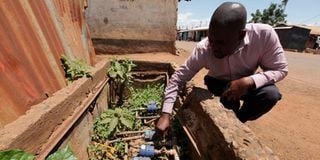Premium
New 10,000 meters to seal Nairobi water cash leaks

A man checks water meters at Nyalenda estate in Kisumu on September 25, 2018.
The Nairobi City Water and Sewerage Company Limited(NWSC) is set to install 10,000 new water meters to seal loopholes that deny it more than half of its revenue from supplies to city residents.
The utility has registered massive revenue shortfalls over the years due to the high amount of unbilled water—crippling its cash flow and operations.
But in a bid to correct the problem, the company has now invited supplies for 10,000 meters to improve revenue collection in the wake of a report by Auditor-General Nancy Gathungu that revealed the company lost billions of shillings through unbilled supplies.
“The domestic water meter must be constructed throughout of materials which are resistant to internal and external corrosion and if necessary be protected by some suitable surface treatment. All materials of the water meter which are in contact with the water flowing through the water meter shall be non-toxic and non-tainting” the water firm said in its tender call.
The audit report for the company’s financial year to June 2020 said that while the firm produced 176.04 million cubic meters of water during that period, only 86.35 million cubic meters were billed to customers.
Public resources
This means that 51 percent (89.69 million cubic meters) of the water was not billed resulting in revenue loss for the firm, which is double the 25 percent that the Nairobi Service Regulatory Board allows the firm to lose. This cost the company Sh4.75 billion in revenue.
“The significant level of non-renewable water is an indication of inefficiency and a lack of effectiveness in the use of public resources and, may negatively impact the company’s profitability and its long-term sustainability,” said Ms Gathungu.
To increase its revenue collection, the company last month also applied to the Water Services Regulatory Board (Wasreb) to raise water tariffs citing rising costs in delivering water to residents.
The tariffs, which are reviewed every three years, recently underwent public participation for scrutiny before being reviewed or approved for use by Wasreb for the next three-year cycle from the financial years 2022/23 to 2024/25.
Nairobi Water wants to raise the cost of water for small households and residential apartments that consume less than six cubic-metres (m2) monthly by a third to Sh45/m2 up from the current Sh34/m2.
Meanwhile, those who use more than 300m2 of water each month will pay Sh80/m2 up from the current tariff of Sh64 for the same quantity, while multi-dwelling units and gated communities, who are currently enjoying a subsidised tariff of Sh53/m2 will now be paying Sh67.





